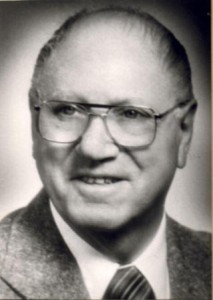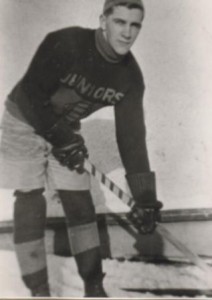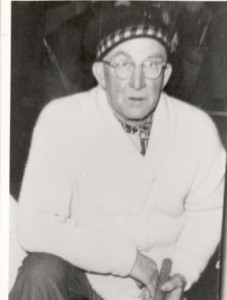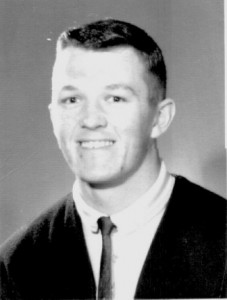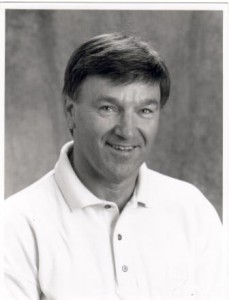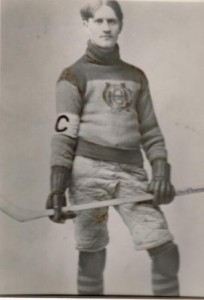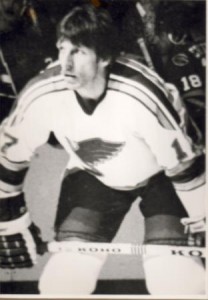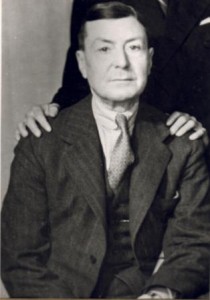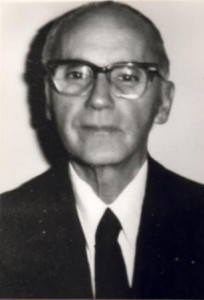 There is a popular cliché that goes “Let George Do It”. It is an expression
There is a popular cliché that goes “Let George Do It”. It is an expression
that is sometime bandied about in a light hearted manner when we are referring
to a person who will take everything you throw at him in the shape of work.
Just change that trite expression to “Let Andy Do It”, and, in the town of
Collingwood, it means only one individual-Andy Morritt of 5 Victory Drive (When you can find him at home).
More suitable addresses for Andy would be the Community Arena or ball park in town.
For almost twenty-five years Andy has been the eye pillar in Collingwood’s Minor
Hockey structure, the Collingwood Kiwanis Minor Softball League and the Blue
Mountain Softball League.
He first became involved in minor hockey in 1958 and since that time had served as
President, Vice-President, Secretary, Collingwood’s representative in the provincial Little N.H.L., equipment manager and the chief organizer for the difficult task of arranging ice time for seven leagues and a hundred or so tournaments.
He was the original organizer of the annual Blue Mountain Pee Wee hockey
Tournament always held during the Christmas school break.
One year the tournament netted fifteen hundred dollars through the sale of programs
and admissions. He was ably assisted by the ladies Auxiliary of the Collingwood Minor Hockey Association.
When he resigned as President, a trophy was dedicated in his honour. This annual
award goes to the person regarded as the most dedicated to Collingwood Minor
Hockey.
Andy, with the assistance of Sam McLeod, founded the Outdoor rink for children on Hurontario Street.
Back in 1957 Andy was a moving force behind the formation of the Collingwood Kiwanis Minor Softball Association under the guidance of Jim Durrant.
It was tough going for Morritt and the Kiwanis Club to keep a couple of dozen
teams in four divisions supplied with coaches, managers and umpires. As the
league grew, the Kiwanis Club found it getting more difficult to keep pace with
the growth and Andy went knocking on the doors for team sponsors. With the help
of the local media and the radio station merchants, service clubs and industries co-operated to keep the association going.
In 1975, a girls’ league was added to the association. Not long ago the Collingwood Kiwanis Club presented Andy Morritt with and award in appreciation of his devoted efforts in helping the youth of the town.
He was the workhorse behind the Blue Mountain Softball League. On two occasions he rallied support for the league when it was on the verge of folding. He seemed
to be the chairman of every committee. He ran the league canteen, raked the
diamond, dusted off the sears, kept a sharp eye on the treasury and even took
on the duties of a Private Eye to track down the culprits who pilfered a couple
of fifty-dollar home plates.
It was a long time in coming but Andy Morritt is now a member of Collingwood’s
Sports Hall of Fame. No man deserves that honour more.
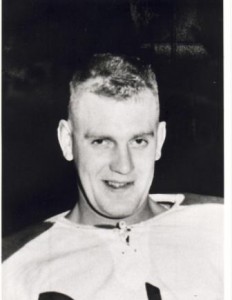 In Collingwood, Charlie Fryer was known as an all-round athlete, but he was best known in baseball and hockey.
In Collingwood, Charlie Fryer was known as an all-round athlete, but he was best known in baseball and hockey.
